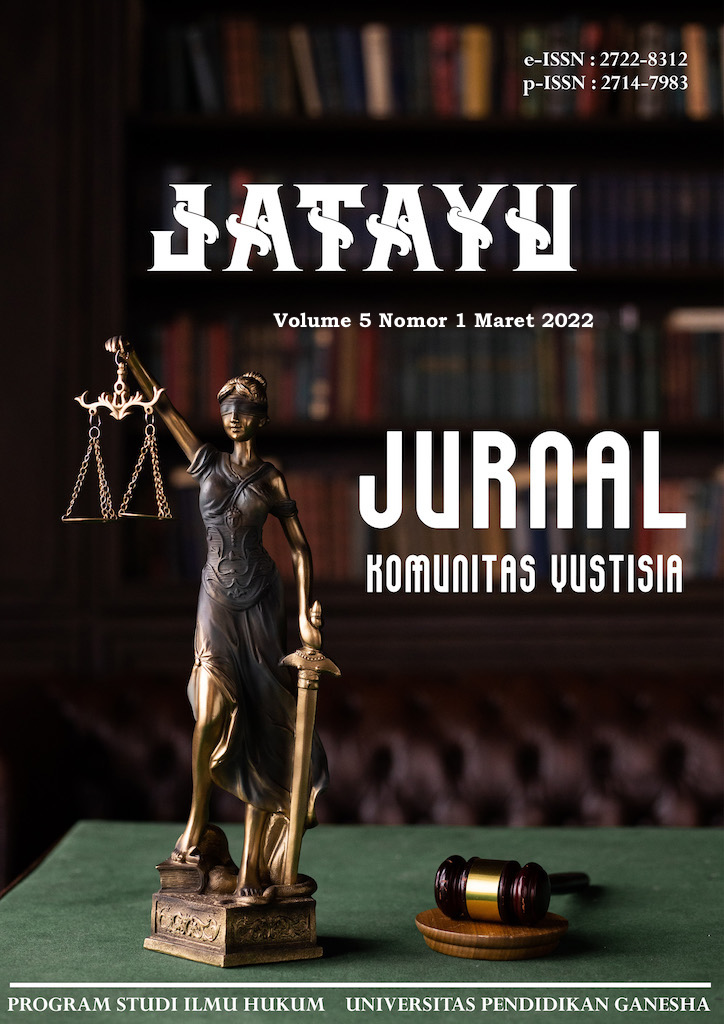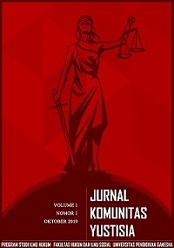UPAYA PENINGKATAN PERLINDUNGAN HUKUM MELALUI MANDATORY CONSULAR NOTIFICATION TERHADAP TENAGA KERJA INDONESIA DI ARAB SAUDI
DOI:
https://doi.org/10.23887/jatayu.v5i2.51630Keywords:
Mandatory Consular Notification, Tenaga Kerja Indonesia, Konvensi Wina 1963Abstract
Penelitian ini bertujuan untuk (1) mengetahui kedudukan Mandatory Consular Notification (MCN) dalam hubungan diplomatik dan konsuler antar negara, dan (2) mengetahui bagaimana upaya pemerintah Indonesia dalam memberikan perlindungan hukum terhadap Tenaga Kerja Indonesia (TKI) di luar negeri melalui MCN. Jenis penelitian yang digunakan adalah penelitian hukum normatif, dengan jenis pendekatan konseptual dan pendekatan kasus. Sumber bahan hukum yang digunakan tidak terlepas dari aturan yang ada pada hukum internasional dengan mengkhususkan pengaturan yang mengatur tentang Hukum Diplomatik dan Konsuler. Teknik pengumpulan bahan hukum yang dilakukan yaitu dengan cara library research atau studi kepustakaan. Teknik analisis dokumen menggunakan bahan hukum yang membahas mengenai teori-teori Hukum Diplomatik dan Konsuler khususnya pada Konvensi Wina 1961 dan Konvensi Wina 1963. Hasil penelitian menunjukan bahwa (1) kedudukan MCN menjadi sangat penting dalam hubungan diplomatik dan konsuler karena perjanjian MCN memiliki kelebihan, yaitu lebih mandatory atau bersifat wajib untuk memberikan notifikasi konsuler, dan (2) upaya yang dapat dilakukan Indonesia adalah mengupayakan terbentuknya perjanjian MCN dengan negara Arab Saudi, karena dengan adanya notifikasi konsuler yang tepat waktu, akan membuat Indonesia dapat memberikan bantuan hukum secara maksimal kepada warga negaranya.
Downloads
Published
Versions
- 2022-10-24 (2)
- 2022-08-26 (1)
Issue
Section
License

This work is licensed under a Creative Commons Attribution-ShareAlike 4.0 International License.
Authors who publish with this journal agree to the following terms: Authors retain copyright and grant the journal right of first publication with the work simultaneously licensed under a Creative Commons Attribution License that allows others to share the work with an acknowledgement of the work's authorship and initial publication in this journal. Authors are able to enter into separate, additional contractual arrangements for the non-exclusive distribution of the journal's published version of the work (e.g., post it to an institutional repository or publish it in a book), with an acknowledgement of its initial publication in this journal. Authors are permitted and encouraged to post their work online (e.g., in institutional repositories or on their website) prior to and during the submission process, as it can lead to productive exchanges, as well as earlier and greater citation of published work (See The Effect of Open Access). Authors who publish with this journal agree to the following terms: Authors retain copyright and grant the journal right of first publication, with the work [SPECIFY PERIOD OF TIME] after publication simultaneously licensed under aCreative Commons Attribution License that allows others to share the work with an acknowledgement of the work's authorship and initial publication in this journal. Authors are able to enter into separate, additional contractual arrangements for the non-exclusive distribution of the journal's published version of the work (e.g., post it to an institutional repository or publish it in a book), with an acknowledgement of its initial publication in this journal. Authors are permitted and encouraged to post their work online (e.g., in institutional repositories or on their website) prior to and during the submission process, as it can lead to productive exchanges, as well as earlier and greater citation of published work (See The Effect of Open Access).






